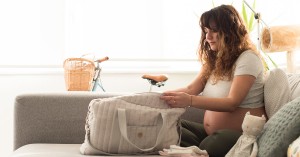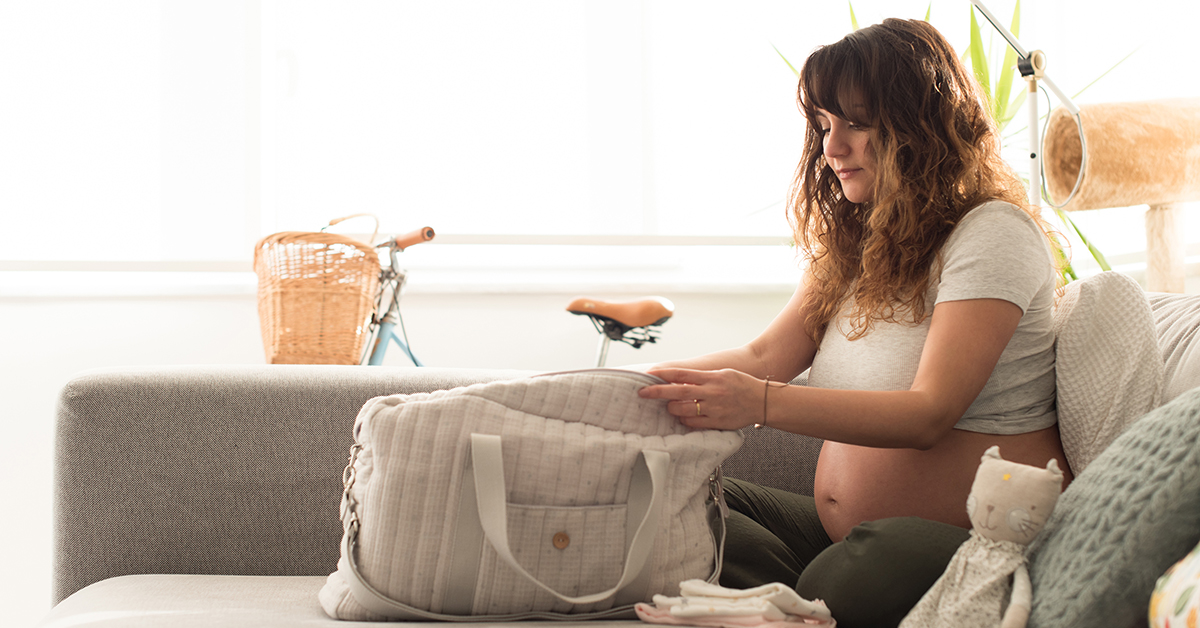 As you’re approaching your due date, you should be focused on finalizing preparations for the hospital and bringing your baby home. One of the things you need to take care of in advance is packing your bag(s) for the hospital. Don’t wait until the last minute to do this so you have time to make sure you have everything on your hospital bag packing list in case you go into labor before your due date. To help, here’s our hospital bag packing list for you, your partner and your baby.
As you’re approaching your due date, you should be focused on finalizing preparations for the hospital and bringing your baby home. One of the things you need to take care of in advance is packing your bag(s) for the hospital. Don’t wait until the last minute to do this so you have time to make sure you have everything on your hospital bag packing list in case you go into labor before your due date. To help, here’s our hospital bag packing list for you, your partner and your baby.
For Mom
- Paperwork and Birth Plan: If you have a birth plan, bring several copies for your chart and the nursing staff. Some people even tape one up in the room for quick reference. Also, make sure you have your insurance information and ID with you. Many times, you can pre-register before you go to the hospital, so if you have that paperwork, bring it as well. A big envelope, pocket folder, or accordion file folder are useful to keep this paperwork in with your bags. You can then use the same folder or envelope to organize the documents you will get at the hospital to take home.
- Toiletries: Depending on the kind of birth you have and whether or not there are complications, the length of your hospital stay can vary. Pack enough to last a few days. Make a list of everything you use on a daily basis for hygiene and comfort and pack those items. They will include toothbrush and toothpaste, facewash or wipes, deodorant, shampoo (dry or regular), and a brush with hair ties if you have long hair. Lip balm is another thing many moms list as a must-have because the air in the hospital can be drying.
- Comfortable Clothes or Pajamas: Thankfully, you won’t have to wear a hospital gown for the entirety of your hospital stay, so comfortable clothes are a must for your hospital bag packing list. Many new mothers swear by robes as postpartum wear, even when there’s something underneath. Loose-fitting natural fibers like cotton or blends with some stretch are often good choices and pajamas or shirts that open in the front are ideal if you are breastfeeding. Also, bring clothes suitable for the trip home. Usually, something that fit you when you were about six months pregnant will work well.
- Phone Charger with Long Cord: Your phone is always by your side and during labor and after childbirth, you will need to have it with you for communication. You will probably also want to take tons of photos of your new child and the most common cameras used are on our phones. So, make sure it always has power. Bring your charger, and invest in an extra-long cord. Many times, electrical outlets are far away from the bed and you’ll want to make sure to have your phone close by.
- Adult Diapers or Pads and Underwear: After you give birth, you are going to be bleeding, so you should have a pad of some kind to absorb the blood. You have probably heard about the pads and mesh underwear the hospital provides for postpartum patients. Some women swear by the hospital version and wish they could have more for home, but many prefer having their own brand. Get pads for heavy flow and use them with comfortable and supportive underwear, but don’t be surprised if they get some blood on them. Some women prefer using an adult diaper for this purpose, as it feels more secure than a pad and can be more protective against leaks.
- Nursing Bra and Pads: If you plan on nursing, then you should go ahead and bring a nursing bra to facilitate easy access for feeding and will give support to swollen and tender breasts. If you aren’t planning on breastfeeding, then many women like sports bras for support and suppressing lactation. Either way, you should bring breast pads to protect against leaks and reduce the need to wash bras as often.
- Nipple Cream or Lanolin: While you and the baby are getting the hang of nursing, your nipples may become sore. Nipple creams or ointments can alleviate some of the discomfort. Lanolin is a natural option that is not harmful to the mother or baby.
- Pillow: Hospital pillows are not well known for being super comfortable. Bringing your own can help you get the rest you need before and after you give birth.
- Towels: Again, the hospital can provide towels but many people find bringing their own to be preferable due to the quality and size of the hospital towels. You will be looking forward to that post-delivery shower (provided you are able to take one), so having a nice towel to use after is a bonus.
- Glasses: If you need corrective lenses, it is recommended you bring glasses instead of worrying about keeping up with contacts and solution. You’ll have enough to worry about without adding that to the list.
- Slippers: Bring slippers and slipper socks. The socks will keep you cozy in bed and with rubber treads on the bottom are safer for walking on the hospital floor when going back and forth from the bathroom. Actual soled slippers can be good as well, especially if you want to walk around during labor.
- Snacks: During labor, you will most likely not be allowed to eat or drink liquids after a certain point. That’s why you see women in labor getting ice chips. You can usually have hard candies or lollipops to prevent dry mouth though. But for after the birth, you need to have something to eat to keep up your energy up and feed the baby, and hospital food may not be what you want. So, bring some healthy and easy to eat snacks on hand. Granola and protein bars, nuts, crackers, and dried fruit are good options. Also, bring a reusable water bottle to stay hydrated. If you want something besides water to drink, electrolyte drinks like coconut water or Gatorade are acceptable.
- Other Suggested (But Not Required) Items: Many people like to make a playlist to listen to during labor to comfort them or give them something nice to focus on during the process. In this case, a Bluetooth speaker or headphones are nice to have so you can hear the music. Massage oils are also sometimes nice to have so your partner can give you a back rub to alleviate back labor pain. If you want to use a camera that is not part of your phone, you can bring that as well, just remember any film, tapes, batteries/chargers for that as well.
For Baby
Once you give birth, you’ll obviously have a whole new person to take care of. So, you should put items for the baby on your hospital bag packing list. One thing that many moms say you DON’T need to worry about packing is a lot of diapers and wipes unless you plan to use a very specific kind. The hospital will provide plenty of diapers and wipes for you to use during your stay and you can usually bring some home with you as well.
- Car Seat: This is the most important item to have with you when you go to the hospital. You will not be allowed to leave the hospital and take your baby home without a car seat. You should already have the car seat properly installed when you go to the hospital.
- Pediatrician’s Information: Keep a copy of your pediatrician’s contact information handy because you will probably be asked for it several times during your time in the hospital.
- Going Home Outfit: It’s recommended that you bring at least two outfits to choose from bring the baby home in. You might have some idea of how big your baby may be when they are born based on prenatal measurements, but you won’t know what size will fit them until they have arrived. To cover your bases, bring weather appropriate clothing in both the newborn size and the 0-3 months size. Hats and socks are also a good thing to include, especially in cooler temperatures. If you are giving birth in a warmer month, you can pack them to be safe.
- Bottles and Formula (If Needed): If you plan on bottle feeding from the start, you should bring a few bottles in small sizes (many brands have a 2 oz version) with you to the hospital. And if you are going to use formula, bring a can of the brand you have chosen with you as well. The hospital will provide some, but it may not be the brand/type you prefer.
For Your Partner
Just because one partner is not doing the work of giving birth, that does not mean they shouldn’t also be comfortable during the hospital stay. After all, they will be there with you every step of the way and probably will not be leaving the hospital much, if at all. If you are having a family member or friend stay with you and not a partner, these things apply to them as well.
- Entertainment: Labor can be a long and drawn-out process. And while there is paperwork to do and a new baby to take care of after the baby is born, there may be downtime to fill, especially if you are looking at a longer hospital stay. So, it is recommended they bring a new book or have audiobooks, podcasts, or videos on a phone or tablet. Be sure to bring headphones and the charger as well.
- Toiletries and Change of Clothes: Just like with mom, a stay at the hospital will require toiletries and changes of clothes for the partner.
- Cash, Including Change: Pack a little bit of cash, especially quarters, in case you want to use the vending machine. Sometimes machines accept cards or the hospital may have an ATM nearby, but don’t depend on that.
- Pillow and Light Sleeping Bag or Linens: The hospital room you are in will probably have a large chair or small sofa that can be used for sleeping during the stay. However, they are not always designed for comfort, and hospital linens are notoriously thin and scratchy. It is recommended you bring a pillow and something that will be more comfortable to sleep on like a sleeping bag or your own sheet or blanket.
- Snacks: Be sure there are plenty of snacks for everyone including both mom and the partner or family member staying with her so you aren’t limited to hospital cafeteria food or snacks from the vending machine. Bring salty things (pretzels, crackers, goldfish), sweet things (gummy candies, M&Ms, or hard candy), fresh or dried fruits and vegetables, and protein (nuts, jerky, or protein bars).
For Additional Questions
At GreenValley OB/GYN, we will be there for every step of your pregnancy and want to make sure you are prepared in all areas. If you have additional questions about what you need on your hospital bag packing list, we can provide guidance. After all, we have over 200 years of combined experience in pregnancy care, so we have some valuable insight! Call us at 336-378-1110 or request an appointment online.
